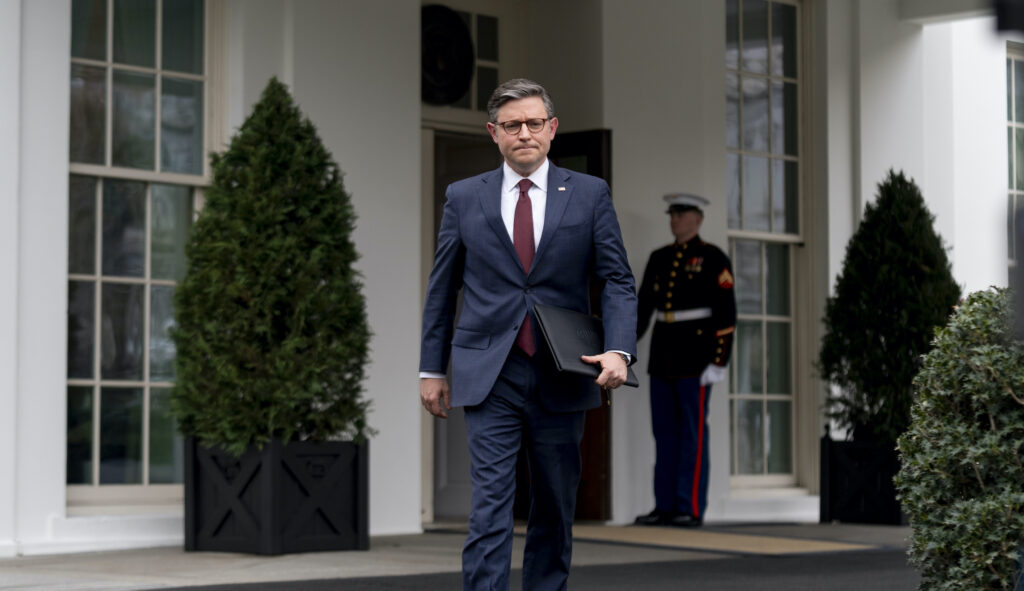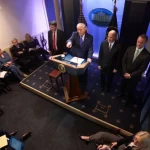
Democrats have made the case for months that a failure to fund Ukraine’s war against Russia would be one of the biggest foreign policy blunders of the 21st century.
The conflict, now in its third year, has settled into a stalemate, but shortages of weaponry and ammunition threaten America’s goal of containing Russian aggression.
That appeal has done little to counteract a growing skepticism within the Republican Party that questions the wisdom of the aid when the war may be headed for a negotiated settlement.
But Democrats have made the case in very personal terms in recent weeks to the Republican whose vote matters most: House Speaker Mike Johnson (R-LA). As speaker, he has the singular authority to bring Ukraine aid to the House floor.
Johnson has vowed to counter Russia in Ukraine, a resolve he reiterated following the mysterious death of Russian President Vladimir Putin’s chief political rival, Alexei Navalny, earlier this month. But his demand that the crisis at the southern border be addressed first, plus his own desire for an exit strategy to the Ukraine conflict, has dimmed hopes the funding will be approved.
Democrats have attempted to break the impasse with a pressure campaign squarely focused on Johnson. For the second time in two months, on Tuesday, he sat for a meeting with congressional leaders at the White House surrounded by defense hawks urging him to act.
Those pleas have come with deal sweeteners. President Joe Biden endorsed a compromise on border security in December that Republicans rejected as insufficiently conservative.
But the biggest argument they’ve made, at least rhetorically, is an appeal to Johnson’s legacy. Inaction would be a blemish that comes to define his speakership, Democrats say.
“Let me be clear: History is not kind to those who appease violent tyranny,” Sen. Maggie Hassan (D-NH), who returned from a congressional trip to Ukraine over the weekend, said in a Tuesday press conference.
It’s a message that has been repeated time and again. Biden declared that “history is watching the House of Representatives” after the Senate passed more than $60 billion in Ukraine funding this month.
It’s been their private message to Johnson, too.
“I said, I’ve been around here a long time. It’s maybe four or five times that history is looking over your shoulder, and if you don’t do the right thing, whatever the immediate politics are, you will regret it,” Senate Majority Leader Chuck Schumer (D-NY) said after the latest meeting at the White House.

Democrats reacted with alarm when Johnson said he would not be “rushed” into taking up the legislation after the Senate approved the funding in a 70-29 vote.
“The Republican-led House will not be jammed or forced into passing a foreign aid bill,” he said at a press conference.
But Johnson is seemingly responding to the pressure. On Tuesday, he promised the bill, or some version of it, would be considered in a “timely manner.”
That’s a far cry from giving the aid a floor vote. However, it does reflect another message the leaders have underlined in recent weeks: urgency.
“It was the consensus in that room: Zelensky and Ukraine will lose the war if we don’t get them the arms and we don’t get them quickly,” Schumer said, referring to the Ukrainian president.
Even Schumer’s Republican counterpart, Senate Minority Leader Mitch McConnell (R-KY), is in favor of the aid. He does not pressure Johnson publicly, choosing to use his remarks to chide Biden instead for not giving Ukraine certain weaponry earlier. But Johnson is truly isolated within the ranks of leadership on this matter.
That’s not by happenstance. Half of Johnson’s conference is skeptical of the aid, in particular the Republicans who hold outsize sway due to his two-seat majority.
Of course, if Johnson put the bill on the floor, it would pass easily with a bipartisan coalition of Republicans and Democrats. However, how Johnson is remembered in the history books goes beyond the conflict in Ukraine.
His speakership will also be remembered for the House tumult that won him the gavel in the first place. Before Speaker Kevin McCarthy’s dramatic ouster in October, Johnson was a little-known congressman from Louisiana.
Now, he lives day to day, just as McCarthy did, with the same threat of being deposed factoring into every decision he makes, including on Ukraine.
Democrats want him to act, but Johnson has articulated to Biden in no uncertain terms that “real border security” is the key that unlocks Ukraine aid. It would be a win that mollifies his right flank and possibly preserves his speakership if the concessions are conservative enough.
Biden has his own legacy to manage. Part of the reason Democrats have been able to present a unified front is because their leader occupies the White House. Anything done to undermine him or his foreign policy agenda could hurt the party writ large.
CLICK HERE TO READ MORE FROM THE WASHINGTON EXAMINER
But Biden is reluctant to undermine that unity with a border deal that would anger progressives, even as the party agrees the matter poses a liability for him in November.
The decision on Ukraine will come down to Johnson, but whether the aid passes could also depend on Biden’s willingness to buck his left flank.






